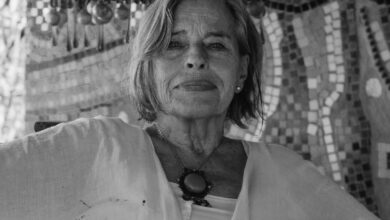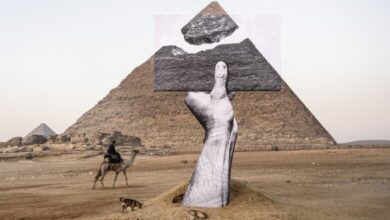The past two weeks have seen Cairo’s Tahrir Square filled by mass protests and scarred by violence. Much of the square is torn up and littered with charred vehicles; many surrounding shops are gutted. But amid this, there is a less distressing phenomenon, one that has become increasingly visible.The Mubarak regime is notorious for restricting freedom of expression, and as a result, the country’s landmark of liberation has become its largest performance art venue, inspired by the spirit of resistance and a growing sense of frustration.
Ahmed Ibrahim Ahmed, a Tahrir-based poet, feels the latter. The 26-year-old spent Sunday afternoon running back and forth, doing his best to keep his art from being knocked over by the bustling crowd. While numerous protesters have taken advantage of the endless amount of plastic cups now littering the square, using them to spell out words and phrases on the pavement, such as "leave" and "Mubarak, get out," Ahmed has taken a different approach, lining up the cups in a series of spirals with himself at the center in order to draw more attention to his energetic poetry recitals.
“I have a bachelor’s degree in mechanical engineering, and the only job I’ve ever been able to get was as a carpenter’s apprentice,” said Ahmed, who has been unemployed for the past five years. “But, in my heart, I am an artist, and this revolution has inspired me and given me a new purpose,” he said with an exhausted smile. Living in Tahrir Square since 28 January, Ahmed claims to have written an “infinite” number of poems, although his themes are somewhat limited. “They are all anti-Mubarak,” he proudly admits. “Anti-government and anti-Mubarak. I have nothing else to say except ‘leave,’ but I will say it in every way that I can.”
Ahmed is particularly proud of his latest poem, "Take a Hint, Idiot." After repositioning his cups, he leaps into his performance space and begins an animated recital: “Cowardly man, your time is up/ the people have spoken, your government’s now broken.” Ahmed’s waving arms and high-pitched wail immediately draw a crowd who applaud him when he finishes, and disperse before he begins again.
A more restrained example of self-expression can be found a few feet away, where a man claiming to be the current governor of Beheira is lying on his back, pretending to be a corpse. Heavily bandaged and suffering from a cold, Abdel Hadi Abdel Muttalib Ragab says he has been in Tahrir Square “since the very beginning” and, like most of his fellow protesters, “won’t leave until Mubarak does.”
“I saw what was happening here in Cairo on television,” the 42-year-old wheezed from his position on the ground. “And I knew I had to come and be a part of it.” Ragab insisted he hasn’t abandoned his constituents in Beheira, that he’s doing this not only for himself, but for them as well. “I’m doing this for all Egyptians. I am lying on my back, but I am not dead. I am symbolizing the martyrs who have been murdered because they fought for their country. I only took a rubber bullet to the face. I have been lucky, but I will not give up.”
Ragab’s "corpse" is surrounded by empty plastic koshary containers. “The media says we spend our days here laughing and singing and eating Kentucky Fried Chicken for free,” he grunts. “We eat koshari. Here is the proof.”
The message behind Ragab’s morbid demonstration seemed to be largely lost on the crowds, with most people stopping to ask if he was in need of medical attention.
Far less cryptic was an interactive display by Hatem Abdel Razek, who sketched a giant portrait of Mubarak–with trash bags for hair and an impressive set of vampire fangs–and invited the people of the square to defile it.
“Spit on his face, he’s stolen our money!” the 45-year-old cheered as he strolled through a gathering crowd. “Spit on his face, he’s killed out children!” It didn’t take much encouragement–protesters swarmed around Mubarak’s face, laughing, spitting and loudly encouraging each other to drag up “as much phlegm as possible.” One old man in a galabeya announced to the crowd that he had been waiting for this chance his entire life and proceeded to dribble enthusiastically, while others jumped in to wipe their muddy feet all over the image. Several young men made the same joke, fumbling with their belt buckles and asking Hatem if they could do more than just spit.
“Everyone protests in the way that they are comfortable with, and this is what I am comfortable with,” explained Abdel Razek, who has been residing in the square for the past thirteen days. “I am here because I can be here, because Mubarak, bless him, has made it possible for me to be here by keeping me unemployed for the past seven years.” Struggling to support his wife and two children, Abdel Razek is now glowing with optimism at what he believes will be an “inevitable change for the better. The people have had their eyes opened and the world is listening. The coward knows his time is up, he knows his people will not tolerate him any more.”
Staring at the president's vampiric phlegm-stained face, it’s difficult to argue with Abdel Razek. “We have been stifled for years, and denied any real chance to express ourselves,” he yelled. “I am not an artist, I am an engineer who has had to resort to construction work to make a living. But this revolution has made artists out of all of us.”




